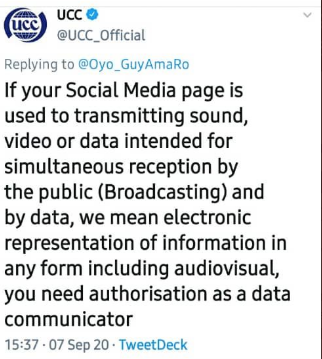Two years after the government introduced a social media tax in Uganda, it now wants all online broadcasters to pay a fee of $27
In Uganda, the ministry of communications has announced the regulations for the development of a “modern communications sector.” The new rules are to regulate people who broadcast information online.
But the regulations are also far reaching. It states that blogs, online radios and newspapers must register before a deadline of October 5, 2020.
“The purpose of this Public Notice, therefore, is to advise all persons currently offering or planning to commence the provision of online data communication and broadcasting services including but not limited to blogs, online televisions, online radios, online newspapers, audio over IP (AoIP), Internet Protocol TV (IPTV), Video on Demand (VoD), Digital Audio radios and televisions, internet/web radio and internet/web television, to obtain authorisation from UCC before providing such services to the public.”
-Uganda Communications Commission (UCC)
The registration process will require a fee of UGX 100,000 ($27) per year and will need applicants to fill out a form asking for their passport and contact information.

New rules will affect everyone creating content online in Uganda
Under the new regulations, people who have Youtube pages will also have to register and pay the fees. But these regulations are not so new; in 2019, the UCC began making it compulsory for all online publishers to register with the government.
At the time, no direct taxes were introduced and the UCC defended the move by claiming it was a way to prevent misinformation.
At the time, the commission’s spokesman, Ibrahim Bbossa said, “these are people who are online radios, online televisions, online publishers.”
“But we are also saying that we equally have people who will be using online platforms, like blogs, like Facebook — still for commercial purposes, and they earn money from it. And they actually disseminate information to wide audiences. The content they put out there is of importance, so we say they should register.”
The real motives
Uganda has a long history of trying to control what its citizens do and say on social media.
In 2018, the government introduced a social media tax called an Over The Top (OTT) tax.
It required social media users to pay a daily fee of 200 Ugandan Shilling (US$0.05) whichy is collected through mobile money services run by the telecom companies in the country. The same law also introduced a 1% tax on all mobile money transactions.
One year after the law was passed, the number of subscriptions to social media services fell by 2.5 million. This did not come as a surprise, as 27% of Ugandans live on less than $1.25 per day.
It is not a jump in logic to assume that the government will be hoping that the same thing will play out with online broadcasters with the introduction of these new fees. With the increasingly important role social media platforms are playing in protests worldwide, Uganda’s President, Yoweri Museveni will continue to make such regulations to keep his hold on power.
UCC says no guidelines have been issued
In the hours after the commission’s first public notice to broadcasters, most of the feedback has been critical of the government. The commission said in a tweet that the draft making the round was a “stakeholder consultation document.”
The commission’s response is confusing, because it has not taken down the public notice it put out in this tweet. It has also not bothered to clarify the many questions people have about who will need to pay the new fees.
In the end, the UCC has left us with more questions than answers as to what part of the guidelines we are now expected to ignore.





















